 W
WWilliam Ambrose Bebb was a Welsh language critic, author and politician.
 W
WNicholas Bennett was a Welsh historian and musician. He was born in Glanrafon, Trefeglwys, Montgomeryshire. His collection of musical works included over 700 Welsh airs. His wrote the songs "Y Cerddor" and "Songs of the Four Nations". He died in August 1899 is buried in Llanfihangel, Trefeglwys.
 W
WJanet Burton is professor of medieval history at the University of Wales Trinity Saint David.
 W
WThomas Mowbray Charles-Edwards is an emeritus academic at Oxford University. He formerly held the post of Jesus Professor of Celtic and is a Professorial Fellow at Jesus College.
 W
WJ. D. (David) Davies is a British historian, specialising primarily in naval history, and the author of both fiction and non-fiction books.
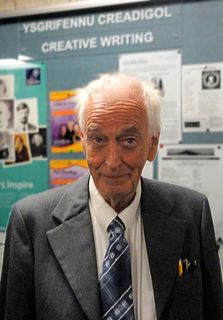 W
WJohn Davies was a Welsh historian, and a television and radio broadcaster. He attended university at Cardiff and Cambridge and taught Welsh at Aberystwyth. He wrote a number of books on Welsh history.
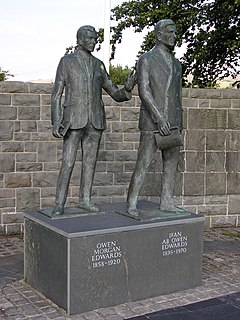 W
WSir Ifan ab Owen Edwards was a Welsh academic, writer and film-maker, best known as the founder of Urdd Gobaith Cymru, the Welsh League of Youth.
 W
WSir Owen Morgan Edwards was a Welsh historian, educationalist and writer. He is often known as O. M. Edwards.
 W
WMarion Evans, is a Welsh historian and writer. She has written extensively about the town of Rhymney and its neighbouring villages and supporting forewords to her publications have been written by Ted Rowlands, Baron Rowlands; George Thomas, 1st Viscount Tonypandy; Eirene White, Baroness White of Rhymney; Roy Noble, BBC Wales; Edwina Hart, Welsh Assembly Minister and Sir Roddy Llewellyn.
 W
WWalter Jenkin Evans was a Welsh academic who served as Principal of Carmarthen Presbyterian College and who wrote about the history and people of Unitarianism in Carmarthen.
 W
WPeter Anthony Freeman is a Welsh author, politician and storyteller.
 W
WGerald of Wales was a Cambro-Norman archdeacon of Brecon and historian. As a royal clerk to the king and two archbishops, he travelled widely and wrote extensively. He studied and taught in France and visited Rome several times, meeting the Pope. He was nominated for several bishoprics but turned them down in the hope of becoming Bishop of St Davids, but was unsuccessful despite considerable support. His final post was as Archdeacon of Brecon, from which he retired to academic study for the remainder of his life. Much of his writing survives.
 W
WFrederick James Hando MBE was a Welsh writer, artist and schoolteacher from Newport. He chronicled the history, character and folklore of Monmouthshire, which he also called Gwent, in a series of nearly 800 newspaper articles and several books published between the 1920s and 1960s.
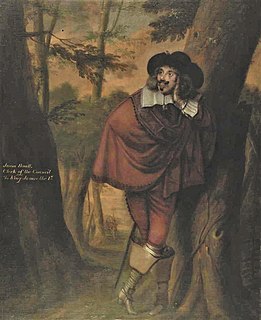 W
WJames Howell was a 17th-century Anglo-Welsh historian and writer who is in many ways a representative figure of his age. The son of a Welsh clergyman, he was for much of his life in the shadow of his elder brother Thomas Howell, who became Lord Bishop of Bristol.
 W
WHarold Hughes or Henry Harold Hughes (1864-1940) was born in Liverpool and trained as an architect under Arthur Baker in London. He qualified as an ARIBA in 1890 and set up an architectural practice in Bangor in 1892, where he remained until his death in 1940.
 W
WTheophilus Jones was a Welsh lawyer, known as a historian of Brecknockshire.
 W
WSaunders Lewis was a Welsh political activist, poet, dramatist, historian and literary critic. He was a prominent Welsh nationalist and one of the founders of Plaid Genedlaethol Cymru, later known as Plaid Cymru. Lewis is usually acknowledged as one of the most prominent figures of 20th century Welsh-language literature. In 1970, Lewis was nominated for a Nobel Prize in Literature. Lewis was voted the tenth greatest Welsh hero in the '100 Welsh Heroes' poll, released on St. David's Day 2004.
 W
WSir John Edward Lloyd was a Welsh historian, He was the author of the first serious history of the country's formative years, A History of Wales from the Earliest Times to the Edwardian Conquest (1911).
 W
WLorin Morgan-Richards is an American author, illustrator, and songwriter, primarily known for his young adult fiction and Weird West series The Goodbye Family.
 W
WKenneth Owen Morgan, Baron Morgan, is a Welsh historian and author, known especially for his writings on modern British history and politics and on Welsh history. He is a regular reviewer and broadcaster on radio and television. He has been an influential intellectual resource in the Labour Party.
 W
WSir William Ouseley HFRSE FSAScot, was a British orientalist.
 W
WThe Reverend Thomas Price was a historian and a major Welsh literary figure of the early 19th century. Price was also "an essayist, orator, naturalist, educationalist, linguist, antiquarian, artist and musician". He contributed to learned and popular journals and was a leading figure in the revival of the Eisteddfod.
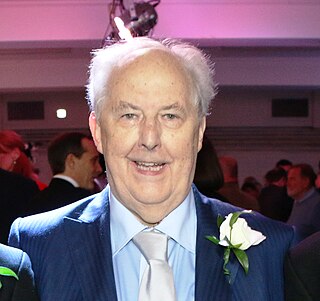 W
WDavid Benjamin Rees, widely known as "Dr D. Ben Rees", is a Welsh and English-language publisher, author, lecturer and minister in the Presbyterian Church of Wales since 1962 and leader of the Welsh community in Liverpool. He leads one of Liverpool's five remaining Welsh chapels. His small publishing house, Modern Welsh Publications Ltd, was established in 1963 and from 1963 to 1968 it operated from Abercynon in the Cynon Valley of South Wales. Since 1968 it has operated from Allerton, Liverpool and is the only Welsh language publishing house still operating in the city of Liverpool.
 W
WJason Shepherd is a Welsh podcast host, author, artist and audiobook narrator. Since 2008 he has produced and hosted the internationally recognized Learn Welsh Podcast, about Welsh language and culture, and has been involved in several book projects. Shepherd was an honorary guest of the Los Angeles St. David's Day Festival between 2011 and 2013, where he taught the Welsh language, and worked as Cultural Editor of Celtic Family Magazine from 2013 to 2015.
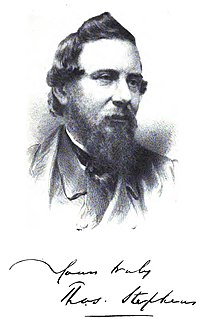 W
WThomas Stephens was a Welsh historian, literary critic, and social reformer. His works include The Literature of the Kymry (1849,1876), Madoc: An Essay on the Discovery of America by Madoc ap Owen Gwynedd in the Twelfth Century (1858,1893), and Orgraff yr Iaith Gymraeg (1859), as well as a number of prize-winning essays presented at eisteddfodau between 1840 and 1858. He was the first Welsh historian and literary critic to employ rigorous scientific methods, and is considered to have done more to raise the standards of the National Eisteddfod than any other Welshman of his time. Stephens also figured prominently in efforts to implement social, educational and sanitary reforms both locally in Merthyr Tydfil and more broadly throughout Wales.
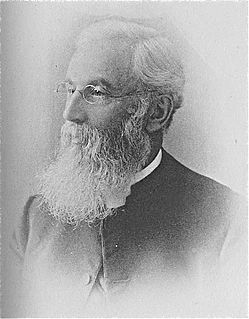 W
WDavid Richard Thomas or Archdeacon D H Thomas was a Welsh clergyman and historian. He was a canon of St Asaph's Cathedral and Archdeacon of Montgomery, as well as being a Fellow of the Society of Antiquaries of London. His major publication was the History of the Diocese of St Asaph, the first such history of a Welsh diocese.
 W
WJoshua Thomas (1719–1797) was a Welsh writer and Particular Baptist minister, known for his history of Welsh Baptists.
 W
WDavid Williams was a Welsh philosopher of the Enlightenment period. He was an ordained minister, theologian and political polemicist, and was the founder in 1788 of the Royal Literary Fund, of which he had been a proponent since 1773.
 W
WSir Glanmor Williams was one of Wales's most eminent historians.
 W
WGwyn Alfred "Alf" Williams was a Welsh historian particularly known for his work on Antonio Gramsci and Francisco Goya as well as on Welsh history.
 W
WDavid Young was a Wesleyan minister and historian.